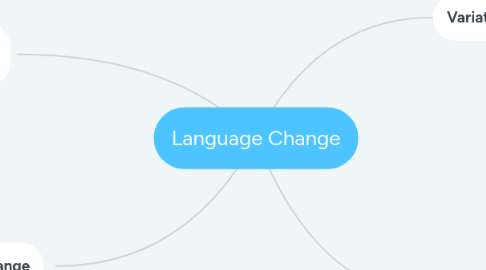
1. How do we study Language Change
1.1. Apparent-time studies of language
1.1.1. Comparing the speech of people of different age; younger speakers use more of the newer forms.
1.1.2. looking at the frequency of the increase and decrease of a form by age group.
1.2. Language change in real time
1.2.1. Observing the changes that occur over a period of time.
1.2.2. Known as real time studies
2. Reasons for Language Change
2.1. Social Status
2.1.1. Introduce changes from other communities which are considered prestigious
2.1.2. Lower class people spread less-conscious linguistic changes.
2.2. Gender
2.2.1. Differences in the speeches of men and women can cause lingustic change.
2.3. Interaction
2.3.1. Interaction among people is crucial in channeling linguistic change.
3. Variation and Change
3.1. post vocalic (r)
3.1.1. In many parts of England and Wales, standard English has lost the pronunciation of [r] following vowels in words.
3.1.2. Post-vocalic [r] does not occur in RP nor in the London Cockney dialect.
3.2. the spread of vernacular forms
3.2.1. It is easy to understand that a pronunciation which is considered prestigious will be imitated and will spread through a community. However, not all linguistic changes involve adopting new forms from outside the speech community.
3.3. koines and koineisations
3.3.1. koineisation is the process by which a new variety of a language emerges from the mixing, leveling, and simplifying of different dialects.
3.3.2. koines is a regional language that becomes standard over time ( lingua franca).
4. How do Changes spread
4.1. from group to group
4.1.1. In any speech community different sets of waves intersect. You belong simultaneously to a particular age group, region and social group.
4.2. from style to style
4.2.1. In the speech of a particular individual, it suggests the change spreads from one style to another
4.3. from word to word - lexical diffusion
4.3.1. sound changes not only spread from one person to another and from one style to another style, they also spread from one word to another

